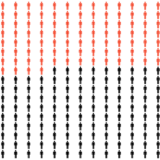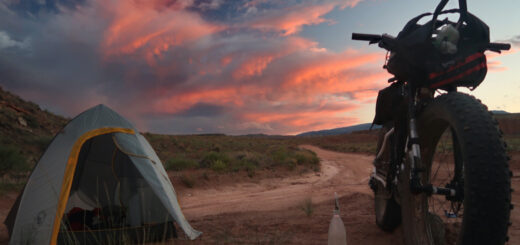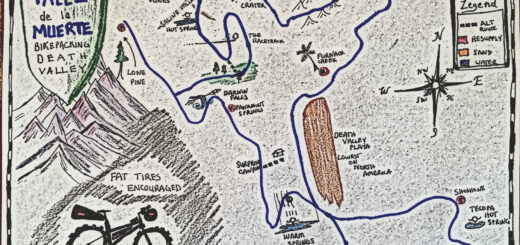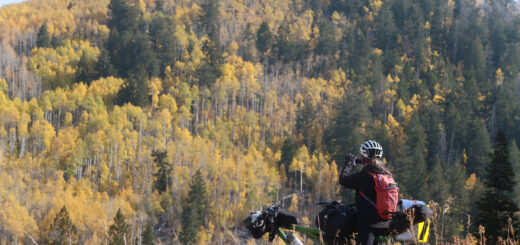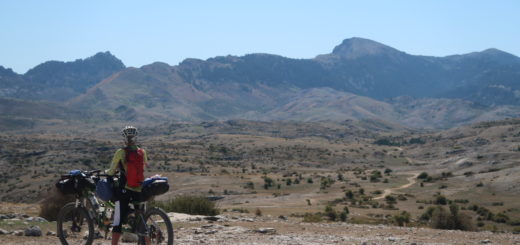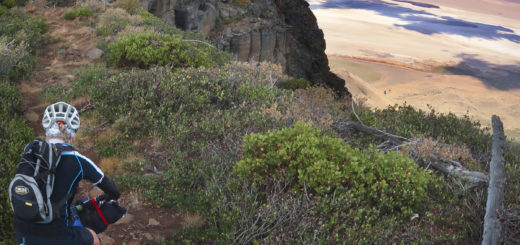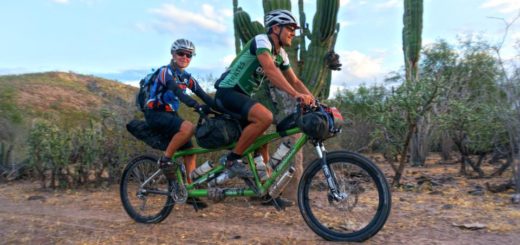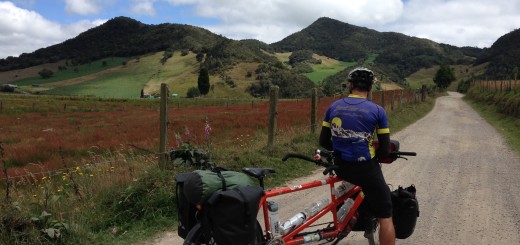01/31/2024 Bikepacking Ghana Day 176 : Thank You For Sharing
This is the second post of a multi-part essay in which I hope to dive deeper into my experience of West Africa. It would be helpful, but not necessary to have already read the previous episode #175, which attempts to “set the stage” for a theory why the Western (as in USA/European western) perspective might be so different from a West African world view. It is targeted towards a North American audience.
******
You may remember me mentioning “My Favorite Mohammed” (MFM) from a couple months ago. I met MFM in Morocco, and we have stayed in touch via WhatsApp since then. He is an English teacher who constantly impresses me with his profound thoughts, articulate writing, and extensive English vocabulary. He has translated Arabic voice clips for me, expanded on Islamic philosophy, and inspired me with his motivation to help out his community by being a teacher. Last month, he wrote:
“I plan to found the English Language Association, I wanted to promote learning English in my community. It's gonna be fun! I hope things will go well in that direction.”
MFM gives me hope and inspiration because he has drive, and a vision of making his community a better place. This is the kind of stuff I love to hear from people, regardless of where they live!
I met a few other people like this too. Maybe you remember the Mohammed from episode 160 with the electricity store? (Let’s call him MSFM - My Second Favorite Mohammed). He too had a sense of purpose and pride that I could appreciate.
Moreover, he was a refugee of a civil war: Starting with nothing, he managed to establish a thriving business that helps his (new) local community. It’s a truly inspirational story.
I like the commonality of how MFM and MSFM both want to provide some sort of service to their communities.
******
In communicating with MFM, I’ve also run some ideas by him. Relevant to this discussion, I’d like to share part of his response to my pondering about people asking me for money (“give me money” - without the use of please), jobs, or a ticket to the USA:
“I believe what's you are undergoing is part of the communal culture of Africa. The tribal mindset is deeply rooted in their psychological make-up and define their view of the world and their relation to the other. Thereby, they see wealth re-distrubution among all members of the tribe as a moral obligation. Obviously, you are being subsumed into that communal system of beliefs and approached as a member of the tribe, everyone expecting from you to share money especially that western whiteman feature in their stereotypical images as invariably rich.
As far as politeness is concerned, It's doesn't feature in the communal cultural system. They see those who have should or must give those who haven't. Giving is not regarded as a favor, but a duty incumbant upon all members of the community.”
In other words, you don’t have to say “thank you” for sharing. It is expected.
******
You may also have noticed the use of the word “duty” again. I discussed this in episode 125, but a sense of “duty” seems to keep coming up.
Even a certain American 🧇 (who wishes to remain anonymous) wrote me when I questioned the idea of giving as “duty”:
“I think it is a positive reflection of the value/moral/code/rule ... There is no judgement in their kindness (are you worthy of my kindness; do I like you: do you look/talk/act like me; will I get something in return if I am kind to you).”
These words seem to dovetail nicely with the world view I’m experiencing.
*****
I like MFM, but this could also be fake news: So I did some fact checking online, and quickly came across the word “Ubuntu”. If you’re like me, the first thing that pops to mind when you hear that word is the Linux operating system. It turns out that the Ubuntu operating system was named after this African concept of sharing. Because it is built voluntarily by a community of software developers, it is meant to be shared instead of sold.
Just to be clear, the term “Ubuntu” is geographically more associated with the Southern part of the continent… but this principle of sharing makes its way throughout Africa.
According to Wikipedia:
“Ubuntu encompasses the interdependence of humans on another and the acknowledgment of one's responsibility to their fellow humans and the world around them. It is a philosophy that supports collectivism over individualism.”
Maybe now West Africa is starting to make a little more sense.
I come from the country historically influenced by Herbert Hoover’s “rugged individualism,” while the people I’m meeting in these tiny villages have a tribal background of “collectivism.” Not just collecting wood and yams, but working together collectively to pool resources.
Someone told me just today that people pooled together money to send a man from Ghana to the United States on an education visa. The idea is that after he finishes school, he will be able to get a job in the US and send money back to his family and sponsors.
I’ve witnessed sharing in-action several times. I notice it mostly amongst children (maybe because I don’t expect kids to share so well). You may remember some posts where children who got more than one of a candy/date/cookie pack would always redistribute the extras automatically. My favorites were the kids in episode 133 who each ate half the pack of cookies I gave them, and then offered the second half to me! We also saw sharing in the form of communal eating - using your hands to eat from the same bowl.
So, I think it is safe to say that people practice and expect sharing. It’s your duty, and if you believe what I wrote in episode 175, by default, a white guy should be doing the redistribution. This is independent of the clothes you wear or the fact that you’re on a “humble” means of transport.
******
Well, I hope you’re getting a better feel for West African culture!
I’ve had a cold for over a week now, and can’t seem to kick it. The rough living, dust, smoke, and diet are probably all co-conspiring, so time for a little rest. Hotelling it - probably from here on out!
******
You may remember me mentioning “My Favorite Mohammed” (MFM) from a couple months ago. I met MFM in Morocco, and we have stayed in touch via WhatsApp since then. He is an English teacher who constantly impresses me with his profound thoughts, articulate writing, and extensive English vocabulary. He has translated Arabic voice clips for me, expanded on Islamic philosophy, and inspired me with his motivation to help out his community by being a teacher. Last month, he wrote:
“I plan to found the English Language Association, I wanted to promote learning English in my community. It's gonna be fun! I hope things will go well in that direction.”
MFM gives me hope and inspiration because he has drive, and a vision of making his community a better place. This is the kind of stuff I love to hear from people, regardless of where they live!
I met a few other people like this too. Maybe you remember the Mohammed from episode 160 with the electricity store? (Let’s call him MSFM - My Second Favorite Mohammed). He too had a sense of purpose and pride that I could appreciate.
Moreover, he was a refugee of a civil war: Starting with nothing, he managed to establish a thriving business that helps his (new) local community. It’s a truly inspirational story.
I like the commonality of how MFM and MSFM both want to provide some sort of service to their communities.
******
In communicating with MFM, I’ve also run some ideas by him. Relevant to this discussion, I’d like to share part of his response to my pondering about people asking me for money (“give me money” - without the use of please), jobs, or a ticket to the USA:
“I believe what's you are undergoing is part of the communal culture of Africa. The tribal mindset is deeply rooted in their psychological make-up and define their view of the world and their relation to the other. Thereby, they see wealth re-distrubution among all members of the tribe as a moral obligation. Obviously, you are being subsumed into that communal system of beliefs and approached as a member of the tribe, everyone expecting from you to share money especially that western whiteman feature in their stereotypical images as invariably rich.
As far as politeness is concerned, It's doesn't feature in the communal cultural system. They see those who have should or must give those who haven't. Giving is not regarded as a favor, but a duty incumbant upon all members of the community.”
In other words, you don’t have to say “thank you” for sharing. It is expected.
******
You may also have noticed the use of the word “duty” again. I discussed this in episode 125, but a sense of “duty” seems to keep coming up.
Even a certain American 🧇 (who wishes to remain anonymous) wrote me when I questioned the idea of giving as “duty”:
“I think it is a positive reflection of the value/moral/code/rule ... There is no judgement in their kindness (are you worthy of my kindness; do I like you: do you look/talk/act like me; will I get something in return if I am kind to you).”
These words seem to dovetail nicely with the world view I’m experiencing.
*****
I like MFM, but this could also be fake news: So I did some fact checking online, and quickly came across the word “Ubuntu”. If you’re like me, the first thing that pops to mind when you hear that word is the Linux operating system. It turns out that the Ubuntu operating system was named after this African concept of sharing. Because it is built voluntarily by a community of software developers, it is meant to be shared instead of sold.
Just to be clear, the term “Ubuntu” is geographically more associated with the Southern part of the continent… but this principle of sharing makes its way throughout Africa.
According to Wikipedia:
“Ubuntu encompasses the interdependence of humans on another and the acknowledgment of one's responsibility to their fellow humans and the world around them. It is a philosophy that supports collectivism over individualism.”
Maybe now West Africa is starting to make a little more sense.
I come from the country historically influenced by Herbert Hoover’s “rugged individualism,” while the people I’m meeting in these tiny villages have a tribal background of “collectivism.” Not just collecting wood and yams, but working together collectively to pool resources.
Someone told me just today that people pooled together money to send a man from Ghana to the United States on an education visa. The idea is that after he finishes school, he will be able to get a job in the US and send money back to his family and sponsors.
I’ve witnessed sharing in-action several times. I notice it mostly amongst children (maybe because I don’t expect kids to share so well). You may remember some posts where children who got more than one of a candy/date/cookie pack would always redistribute the extras automatically. My favorites were the kids in episode 133 who each ate half the pack of cookies I gave them, and then offered the second half to me! We also saw sharing in the form of communal eating - using your hands to eat from the same bowl.
So, I think it is safe to say that people practice and expect sharing. It’s your duty, and if you believe what I wrote in episode 175, by default, a white guy should be doing the redistribution. This is independent of the clothes you wear or the fact that you’re on a “humble” means of transport.
******
Well, I hope you’re getting a better feel for West African culture!
I’ve had a cold for over a week now, and can’t seem to kick it. The rough living, dust, smoke, and diet are probably all co-conspiring, so time for a little rest. Hotelling it - probably from here on out!
Photos:

This is the profile photo from the friendly border guard who I liked so much. For some reason, his choice of profile photo makes me like him more. Her name is Edith Smith:
—

I got a black-market SIM! So, to put money on your SIM, you go to a kiosk like the one on the left. They can be found EVERYWHERE.. usually within sight of each other. You hand over cash and they type your phone number and how much $$ into their flip phone. If you are buying “airtime,” you get a little bit less credit than you paid. That is how they make their profit at the kiosk. These kiosks must be job opportunities; I’m guessing like a franchise in the US.
Anyway, You can “store” money on your phone, and in some places, you can pay with it as shown on the left. So let’s say you have 100 cedi after selling eggs all day. Skip the bank, drop your cash off with these guys, and now you’re saving. I could have paid for my hotel this way.
—

Ok, think I’ll stick with the cookies.

Kevin Shaw had asked about people selling local products locally. Once you get closer to the towns on the paved roads, you see it happens. This is for selling (and weighing) cashews. From the looks of it, people are selling them in their toxic husks.. so I wonder if the buyers are middlemen who prepare them for consumption? Cashews are expensive at home, but if you consider what must go into the processing, they actually seem cheap.

Once I crossed into Ghana, Christianity took the reigns again. There are all sorts of Christian signs everywhere! Very little Muslim influence. It is easy for me with names like Mary, Josephine, Sampson….
Strava Comments:
terri W.
I really enjoyed reading this post. You have really helped me understand the “sharing” concept well as I’ve often wonderd if it’s wearing on you to be constantly approached. Constantly asked for money and jobs. Additionally it’s so nice to explain “Ubuntu” as it relates to Africa.
My husband says his goal is converting the world to Ubuntu. ❤️ in fact he’s converted and restored countless computers free of charge for years He just restored our former 95 YO neighbor to Ubuntu and because so many of his convertees are elderly he wrote a simple user guide for the sight impaired. He provides lifelong tech support to the Ubuntu converts. Of course free of charge. Kudos to to the software engineers that continue to upgrade Ubuntu. It’s virus resistant and easy to use for computer challenged too! I find myself looking forward to your posts every day! Safe travels! Get well ❤️!
Ann L.
Some interesting insights today. Thanks for a new perspective.
What is that on top of that woman’s head? Some kind of dead animal, pig? I’d definitely stick with the cookies!
Hope you feel better soon.
Janet W.
Ah yes, I can see that MFM's community tribal-sharing culture explains a lot. It sounds exactly like what you have been experiencing with the requests for food, money and trips to the US. It's not rude of them to ask, and you have been giving all of those thing, except for the trips. In addition to cookies, purchases and donations you have been giving your time and sharing conversations. It sounds like almost everyone enjoys talking to you, and who wouldn't. I like talking to you and I'd like to see you soon too! I think the basket on that woman's head hold a huge cassava root. Also, in yesterday's photos, were those 2 dead pigs on the back of the motorcycle? terri willert , lots of kudos to Jeff for helping so many oldsters keep-it-going with computers!
Brian L.
terri willert - wow! Thanks for sharing ( 😉 ) that story about Jeff. Had no idea he did that! Very cool 😎!
Brian L.
Janet Wagner , yes, those were two pigs. Not sure if they were dead. I’ve even seen cows on the back of motorcycles, but didn’t get the camera to work in time. Ann Luce - not sure what that is! But it looked 🤢!
Mark G.
Very interesting and inspiring post regarding community building and sharing. "Ask not what your....but what...". Brian, you'll remember from the podcast on "giving money" when most all groups that received individual money decided to pool it together. Sorta Ubuntu. •••••• Get Well Soon!
Paula G.
I have NEVER read so much of someone's posts before! I usually get bored when I see so much writing, and I look for something else to read. You have kept me captivated the whole way. This isn't a philosophical post at all.....just letting you know how appreciated and interesting your posts are.
Ride Stats:
| Elapsed Time | Moving Time | Distance | Average Speed | Max Speed | Elevation Gain | Calories Burned |
|---|---|---|---|---|---|---|
|
01:19:09
hours
|
00:31:02
hours
|
3.10
km
|
10:01
min/km
|
5:50
min/km
|
16.00
meters
|
225
kcal
|










